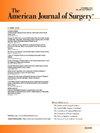黑人患者不确定甲状腺结节的分子检测性能。
IF 2.7
3区 医学
Q1 SURGERY
引用次数: 0
摘要
目前甲状腺结节的分子检测评估恶性风险没有考虑种族遗传变异,可能引入偏见。方法:对2015年至2023年2905例甲状腺结节细针穿刺(FNA)患者进行回顾性分析。不确定结节分为Bethesda III型和Bethesda IV型。通过比较Afirma检测结果和组织病理学结果来评估分子检测的性能。结果:在662例FNA结果不确定的患者中,173例(26.7%)为黑色,474例(73.3%)为白色。黑人患者的良性呼唤率较高(45.7%比34.7%,p = 0.035)。根据手术病理,黑人患者分子检测为良性结节的恶性率为16.7%,白人患者为7.7% (p = 0.574)。黑人患者分子检测的敏感性较低(88.5%对96.1%,p = 0.349),预测值较低(84.6%对90%,p = 0.492)。结论:分子检测可能遗漏黑人患者的甲状腺癌,可能影响预后。外科医生应仔细解释分子检测结果作为整体甲状腺结节治疗的一部分。本文章由计算机程序翻译,如有差异,请以英文原文为准。
Performance of molecular testing for indeterminate thyroid nodules in Black patients
Introduction
Current molecular testing of thyroid nodules assesses malignancy risk without considering racial genetic variations, possibly introducing bias.
Methods
We conducted a retrospective analysis of 2905 patients who underwent fine needle aspiration (FNA) for thyroid nodules from 2015 to 2023. Indeterminate nodules were classified as Bethesda III and IV. The performance of molecular testing was assessed by comparing Afirma test results with histopathological findings.
Results
Among 662 patients with indeterminate FNA results, 173 (26.7 %) were Black and 474 (73.3 %) were White. The benign call rate was higher in Black patients (45.7 % vs. 34.7 %, p = 0.035). Malignancy rates based on surgical pathology were 16.7 % for nodules classified as benign by molecular testing in Black patients and 7.7 % in White patients (p = 0.574). There was a trend toward lower sensitivity (88.5 % vs. 96.1 %, p = 0.349) and negative predictive value (84.6 % vs. 90 %, p = 0.492) in molecular testing for Black patients.
Conclusions
Molecular testing might miss thyroid cancers in Black patients, potentially impacting prognosis. Surgeons should carefully interpret molecular testing results as part of holistic thyroid nodule treatment.
求助全文
通过发布文献求助,成功后即可免费获取论文全文。
去求助
来源期刊
CiteScore
5.00
自引率
6.70%
发文量
570
审稿时长
56 days
期刊介绍:
The American Journal of Surgery® is a peer-reviewed journal designed for the general surgeon who performs abdominal, cancer, vascular, head and neck, breast, colorectal, and other forms of surgery. AJS is the official journal of 7 major surgical societies* and publishes their official papers as well as independently submitted clinical studies, editorials, reviews, brief reports, correspondence and book reviews.

 求助内容:
求助内容: 应助结果提醒方式:
应助结果提醒方式:


